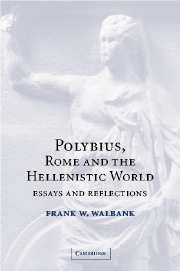1 - Polybian studies, c. 1975–2000
Published online by Cambridge University Press: 22 September 2009
Summary
During the years following the end of the Second World War there was a remarkable surge of interest in Polybius, which it is hard to dissociate entirely from the contemporary clash of powers and the rise of the United States to preeminence, which were to dominate the next fifty years. For Polybius' central theme was of course the century-long struggle between Rome and Carthage and the rise of Rome to domination in her own world of cities and kingdoms, the oecumene. Be that as it may, the publication of a succession of books and articles on Polybius during the sixties – a trend already foreshadowed in the forties and fifties in Ziegler's important Real-Encyclopädie article, von Fritz's long study of Polybius' discussion of the mixed constitution and the first volume of my own Commentary – has led more than one scholar to speak of a ‘Polybian renaissance’.
Some of this work has reflected historians' current interest in such topics as rhetoric and narrative technique, but on the whole older problems have remained uppermost in discussion: on the one hand Polybius' views on his own craft, his methods of composition and the content and purpose of his work and, on the other, his explanation of how and why Rome had been so successful, together with his own attitude towards Rome and her domination since 168 bc.
- Type
- Chapter
- Information
- Polybius, Rome and the Hellenistic WorldEssays and Reflections, pp. 1 - 28Publisher: Cambridge University PressPrint publication year: 2002



